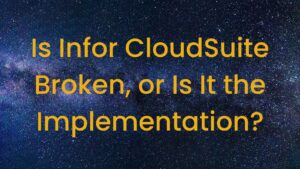This has been an amazing year so far. Technology has continued to evolve while many organizations begin their digital transformation journeys. Some have been successful so far, while others have struggled.
On a personal level, our company began working with 15 new clients in the last 6 months since spinning off from our last company. We also published our lessons from over 1,000 ERP implementations to share our learnings from client work over the last 20 years.
In our quest to continue helping our clients reach the Third Stage of Digital Transformation, we also need to look to the future. There are a number of emerging trends that point to an equally exciting year ahead in 2019.
Here are our top 10 ERP and digital transformation predictions for 2019:
Table of Contents
Toggle1.There will be a shakeup in the top ERP systems
The first prediction is a shakeup among the top ERP systems in the market. Our technology-agnostic top ERP systems ranking for 2019 is based on a number of factors, such as average business value delivered and implementation time, cost, and risk. While an organization’s individual needs should be the most important decision factor, the ranking can provide a good comparison of various options.
This year’s ranking underscores the constantly-changing nature of the ERP software industry. In years past, Salesforce and Workday would have never been considered ERP systems per se, but they make the top of the list this year. And ERP systems such as Microsoft Dynamics 365 and NetSuite fared much better in this year’s rankings than in years past. In contrast, incumbents such as Oracle did not make the list of top ERP systems. This all points to a very dynamic enterprise technology space in the coming year.

2.Traditional ERP implementations will become increasingly obsolete
While we are publishing a list of top ERP systems, we are also predicting the obsolescence of ERP implementations as we know it. Implementing ERP like it’s 1999 didn’t work then – and it’s definitely not working now. In 2019, more companies will find success by broadening their view of enterprise technology.
Instead of viewing ERP implementations as a way to automate back-office functions or to automate already inefficient business processes, more technologically innovative organizations will find success by breaking with the status quo. For example, more forward-leaning organizations are finding great success focusing on the last mile of ERP rather than falling short. Others are engaging in true digital transformations vs. traditional ERP implementations, which is the wave of the future. As a result, traditional ERP implementations will continue to fade in 2019.
3.More companies will focus on two-tier digital transformation approaches
The increasing focus on digital transformation will also enable more two-tier implementation approaches. Instead of assuming that a single software solution or single vendor can deliver the breakthrough capabilities required for the future, more companies are finding value in a two-tier approach involving multiple systems for different functions.
For example, divisions of larger parent companies are finding value in the two-tier ERP implementation approach. The parent company may be rolling out a standardized back-office system such as SAP S/4HANA or Oracle Cloud ERP, while the divisions may roll out more customer-facing systems that are more aligned with their culture and needs. The proliferation of technology options and integration tools makes this a viable option for many organizations we work with.
4.Implementation readiness will become a prerequisite for transformation success
Too many companies have jumped blindly into their ERP implementations without a clear plan or organization. We can expect that to change in 2019, largely because more companies are apt to deploy multiple technologies when compared to the past. We are seeing more companies begin with a “Phase 0” implementation readiness stage to build a strong foundation for implementation success – before the meter starts running on the army of implementation consultants.
5.Cloud ERP will reach the tipping point of adoption
Some have been touting the death of on-premise ERP for years now. I was not one of them – until this year. I don’t know that on-premise will ever completely go away, but 2019 will be the year that cloud ERP reaches the tipping point of adoption. Software vendors and the entire ERP ecosystem are all investing too much money in their flagship cloud products for this not to influence adoption rates. Next year will be the year that this materializes in very real ways.
6.Digital transformation failures will continue to increase
Most predictions tend to be optimistic, but there are some not-so-positive trends on the horizon as well. There are a number of broader trends that will coalesce to increase the failure rates of digital transformation initiatives.
There are a number of reasons why digital transformation failures are on the rise. For example, customers are being forced off of their legacy on-premise systems, while vendors and implementations teams are focusing too much on technology. In addition, our ERP expert witness practice has seen a marked increase in demand. These and a number of other factors point to a landscape that is likely to result in more ERP failures in 2019.

7.ERP system integrators will be held increasingly accountable for their results
I recently wrote about how many ERP system integrators are rigging their clients’ digital transformations. This isn’t always intentional and doesn’t apply to all system integrators, but track records suggest that there are many bad actors in this space.
The coming year may just be the year that organizations learn how to avoid ERP failure. They will hold their system integrators accountable by leveraging effective (and independent) third parties to manage those integrators. Just as importantly, they will begin to realize that there are plenty of viable consulting options outside the realm of Deloitte, Accenture, Capgemini, and other big system integrators. One way or another, system integrators will be forced into more accountability for actual results.
8.Organizational change management will become the key to digital transformation success
Organizational change management is the number one key to digital transformation success – and it always has been. The coming year will be the year that organizations begin to recognize this fact and invest accordingly.
Advances in technology have made transformations more complex. Changes to business processes, organizational cultures, and business models have made change management strategies indispensable to success. Organizations will continue realizing this as predictive analytics, artificial intelligence, machine learning, and other technological advances put more “people” pressure on digital transformations.

9.Further disruption in the independent ERP consulting space
This last year saw disruptions in the ERP consulting space (including my departure from Panorama Consulting), and 2019 is likely to see more. Some hold themselves out to be independent when they’re really not, while others fail to focus on the critical success factors that can make or break their clients’ digital transformations.
The best independent ERP consultants will continue to attract the world’s leading organizations as clients, while lesser successful ones will continue to struggle with employee turnover and financial distress. We also predict that the weaker consulting firms will no longer exist in 2019, so watch for a shakeout of the weaker performers.
10.Digital strategy will become a prerequisite for digital transformation success
The digital transformation space is becoming more complex from a technological, operational, and organizational perspective. The proliferation of technology options and the impact on businesses is greater than it has ever been. This all points to the need for a clear digital strategy to help effectively navigate various options.

What do the top digital transformation and ERP predictions mean to your business?
The constantly changing digital transformation landscape will lead to more options, complexity, opportunities, and risk. Navigating these challenges and opportunities require the help of a skilled team of independent consultants that have your best interests in mind. Companies like Third Stage Consulting can help guide you through the process.
Contact us to learn how we can help your transformation reach the third stage of digital transformation success. We would be thrilled to discuss how we might help make your digital transformation successful in 2019 – and beyond!





